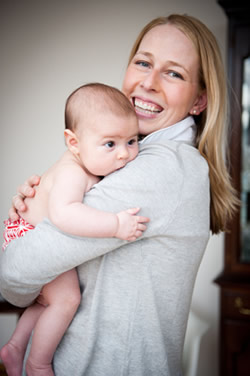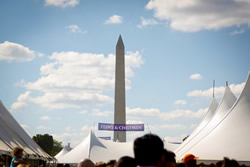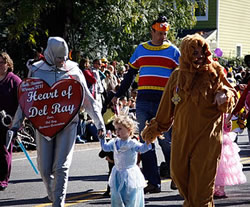- Home » Expat Articles » Interviews » Interview With Ania - American Diplomat's Wife
Interview With Ania - American Diplomat's Wife
| Published: | 3 Jan at 1 PM |
Want to get involved?
Become a Featured Expat and take our interview.
Become a Local Expert and contribute articles.
Get in touch today!
Become a Local Expert and contribute articles.
Get in touch today!
Filed: Interviews,USA
Ania Krasniewska went to school to study diplomacy but took up a career in business consulting, and married a business consultant who took up diplomacy. She is mother to one diplo-tot, and writes about their adventures at home and abroad at The New Diplomat’s Wife (see listing here). She recently returned from her last post in Vienna, Austria, for a rotation to Washington, DC, where she currently lives and works, and is getting the family ready for a move to Copenhagen, Denmark this summer.
Where are you originally from?
I’m originally from Poland and came to the United States at age three, first to Chicago and then growing up mostly in Fargo, North Dakota.
In which country and city are you living now?
We’re currently living in Washington, DC.
How long have you lived here and how long are you planning to stay?
This time around, we’ve been here for about a year and a half, with six months left to go until our next move, which will be to Copenhagen, Denmark. But DC is very much our home base, and we’ve lived here off and on for the past decade.
Why did you move and what do you do?
We move around about every 2-3 years because of my husband’s career with the US foreign service as a diplomat. I’ve been the spouse that tags along, but I’ve been lucky since I’ve been able to bring my work as a consultant with me to the places we’ve lived.
Did you bring family with you?
Yes, we usually travel as a family. With one exception of an unaccompanied tour to Saudi Arabia that my husband did before we were married, we’ve always traveled together. Our daughter was born in Vienna, and now she’ll be coming with us to Copenhagen.
How did you find the transition to living in a foreign country?
The transition can always be a bit tricky, and you often find that it’s a collection of little things that finally become challenging for you, rather than one single big major difference. Similarly, I think it’s often toughest to come home rather than go to a completely new place for the same reason. When something is dramatically different, I think you find you will be kinder on yourself to absorb the differences and changes, but when changes are smaller, or when you return home to something you assume will be familiar, you don’t give yourself much space to adjust or to be surprised. But like everything, transitions take time. I find that it takes somewhere between 18-24 months to really be comfortable in a new place, so we try to work fast since we often only have 2-3 years in our posts!
Was it easy making friends and meeting people; do you mainly socialise with other expats?
It’s easiest to meet other expats that work in the same capacity you do because you have the benefit of work to introduce you. We’ve been close to others in our embassy communities, but we also work hard to meet people outside of those circles so that we get a clearer picture of what it means to live in that place. Fellow expats are great for understanding your fascinations and frustrations with a particular place, and they’re great for sharing adventures with. But nothing beats local friends for showing you the real ropes around town.
What are the best things to do in the area; anything to recommend to future expats?
Washington is a great international community that’s very transient. People are always rotating in or rotating out, so you find a lot of like minded souls, even though everyone is from a different place in the world. It’s a great place to learn more about the American political process, and Washington has a huge wealth of museums and cultural festivals, many of them free. A performance at the Kennedy Center is not to be missed, as well as Sunday strolls in Georgetown. And finally, for day trips, the homes of our founding fathers are beautiful side trips as well as an afternoon in St. Michaels, MD for an Eastern Shore experience.
What do you enjoy most about living here?
For us time in Washington has been a time to reconnect with home. American diplomats do rotations at home much more often than their international counterparts, but I think this is a very important time to reconnect with not just family and friends but also with policy decisions and culture, so that you can represent the United States abroad most genuinely.
How does the cost of living compare to home?
This is home for us so the equation is a little bit different. Interestingly enough, the cost of living at home is much higher than it is when we live abroad. While many places, especially in Europe, are more expensive than the US, when we’re abroad we have different structures in place, for example, housing. But when you return home, you return as a local private citizen, so your cost of living actually goes up substantially.
What negatives, if any, are there to living here?
The pace in Washington, or generally in the US is a lot faster compared to places we were before and there is a feeling of “always on” between being connected and reachable all the time and that takes some adjustment. As a consumer, it’s often easy to feel overwhelmed by choice, especially if you’re coming from somewhere where there were fewer options.
If you could pick one piece of advice to anyone moving here, what would it be?
Come with an open mind and consider having a car. Nearly everything in the US, apart from daily communting if you live and work downtown, is easier in a car.
What has been the hardest aspect to your expat experience so far?
I think we’ve been pretty lucky in our experiences so far in the sense that they haven’t been difficult living per se. If anything, the difficult part about this lifestyle is that it’s time to pack up and move on just as you’re getting comfortable at the location you’re living in. Part of you has a bit of an internal barometer letting you know it’s time to move on to the next adventure, but at the same time, it’s hard to leave behind such good friends who have opened up homes to you and the experiences that have shaped your world. You always take a piece of your post with you when you leave.
What are your top 5 expat tips for anyone following in your footsteps?
Tell us a bit about your own expat blog.
I write a daily blog that covers our adventures wherever we happen to be living. It serves as a way to share our experiences and photography, but also my broader interests in cultural events, and travel and entertaining. I find that there is a very dated understanding of what it meant to be the spouse of a diplomat so I wanted to paint a more contemporary picture of what that life looks like, while at the same time creating a place for us to gather all those memories and have a tool to interact with a broader community.
How can you be contacted for further advice to future expats coming to your area?
Via email: thenewdiplomatswife{at}gmai{dot}.com and Twitter @thenewdiplomats.
Ania blogs at http://www.thenewdiplomatswife.com/ which we recommend a quick visit if you haven't been already. The New Diplomat’s Wife has an ExpatsBlog.com listing here so add a review if you like! If you appreciated this interview with Ania, please also drop her a quick comment below.
Here's the interview with Ania...
Where are you originally from?
I’m originally from Poland and came to the United States at age three, first to Chicago and then growing up mostly in Fargo, North Dakota.
In which country and city are you living now?
We’re currently living in Washington, DC.
How long have you lived here and how long are you planning to stay?
This time around, we’ve been here for about a year and a half, with six months left to go until our next move, which will be to Copenhagen, Denmark. But DC is very much our home base, and we’ve lived here off and on for the past decade.
Why did you move and what do you do?
We move around about every 2-3 years because of my husband’s career with the US foreign service as a diplomat. I’ve been the spouse that tags along, but I’ve been lucky since I’ve been able to bring my work as a consultant with me to the places we’ve lived.
Did you bring family with you?
Yes, we usually travel as a family. With one exception of an unaccompanied tour to Saudi Arabia that my husband did before we were married, we’ve always traveled together. Our daughter was born in Vienna, and now she’ll be coming with us to Copenhagen.
How did you find the transition to living in a foreign country?
The transition can always be a bit tricky, and you often find that it’s a collection of little things that finally become challenging for you, rather than one single big major difference. Similarly, I think it’s often toughest to come home rather than go to a completely new place for the same reason. When something is dramatically different, I think you find you will be kinder on yourself to absorb the differences and changes, but when changes are smaller, or when you return home to something you assume will be familiar, you don’t give yourself much space to adjust or to be surprised. But like everything, transitions take time. I find that it takes somewhere between 18-24 months to really be comfortable in a new place, so we try to work fast since we often only have 2-3 years in our posts!
Was it easy making friends and meeting people; do you mainly socialise with other expats?
It’s easiest to meet other expats that work in the same capacity you do because you have the benefit of work to introduce you. We’ve been close to others in our embassy communities, but we also work hard to meet people outside of those circles so that we get a clearer picture of what it means to live in that place. Fellow expats are great for understanding your fascinations and frustrations with a particular place, and they’re great for sharing adventures with. But nothing beats local friends for showing you the real ropes around town.
What are the best things to do in the area; anything to recommend to future expats?
Washington is a great international community that’s very transient. People are always rotating in or rotating out, so you find a lot of like minded souls, even though everyone is from a different place in the world. It’s a great place to learn more about the American political process, and Washington has a huge wealth of museums and cultural festivals, many of them free. A performance at the Kennedy Center is not to be missed, as well as Sunday strolls in Georgetown. And finally, for day trips, the homes of our founding fathers are beautiful side trips as well as an afternoon in St. Michaels, MD for an Eastern Shore experience.
What do you enjoy most about living here?
For us time in Washington has been a time to reconnect with home. American diplomats do rotations at home much more often than their international counterparts, but I think this is a very important time to reconnect with not just family and friends but also with policy decisions and culture, so that you can represent the United States abroad most genuinely.
How does the cost of living compare to home?
This is home for us so the equation is a little bit different. Interestingly enough, the cost of living at home is much higher than it is when we live abroad. While many places, especially in Europe, are more expensive than the US, when we’re abroad we have different structures in place, for example, housing. But when you return home, you return as a local private citizen, so your cost of living actually goes up substantially.
What negatives, if any, are there to living here?
The pace in Washington, or generally in the US is a lot faster compared to places we were before and there is a feeling of “always on” between being connected and reachable all the time and that takes some adjustment. As a consumer, it’s often easy to feel overwhelmed by choice, especially if you’re coming from somewhere where there were fewer options.
If you could pick one piece of advice to anyone moving here, what would it be?
Come with an open mind and consider having a car. Nearly everything in the US, apart from daily communting if you live and work downtown, is easier in a car.
What has been the hardest aspect to your expat experience so far?
I think we’ve been pretty lucky in our experiences so far in the sense that they haven’t been difficult living per se. If anything, the difficult part about this lifestyle is that it’s time to pack up and move on just as you’re getting comfortable at the location you’re living in. Part of you has a bit of an internal barometer letting you know it’s time to move on to the next adventure, but at the same time, it’s hard to leave behind such good friends who have opened up homes to you and the experiences that have shaped your world. You always take a piece of your post with you when you leave.
What are your top 5 expat tips for anyone following in your footsteps?
- If you follow someone for an expat position, try to keep your home based job in a remote work arrangement if you can. It gives you the maximum amount of flexibility from a salary and work experience, and findings quality jobs on nearly any local economy can be more difficult than expected.
- Give yourself space to adjust – even in seemingly the best locations, there can be tough days. It’s okay to get homesick. This also applies when you return home; you’ll come home a different person so don’t expect to have the same reactions.
- Pack your own mattress, art work, and photographs: everything else is negotiable. Nothing says home like your own bed and the visual things that make your space your own.
- Be flexible: It sounds like a given, but in expat careers, something is always changing – the location, the time frame, the housing… Stick up for yourself when it’s necessary, but realize that these are often very non-precise arrangements that depend on the needs of larger institutions so individual flexibility is key to your sanity.
- You went abroad because it was different, enjoy what is different. You don’t necessarily have to like everything different but try to enjoy the experience of new things. Try to meet locals outside of the expat communities, try foods, travel locally, support artisans, attend the big cultural events. All of those things help to really define the experience of living somewhere else and those are all the things your friends back home will want to hear about!
Tell us a bit about your own expat blog.
I write a daily blog that covers our adventures wherever we happen to be living. It serves as a way to share our experiences and photography, but also my broader interests in cultural events, and travel and entertaining. I find that there is a very dated understanding of what it meant to be the spouse of a diplomat so I wanted to paint a more contemporary picture of what that life looks like, while at the same time creating a place for us to gather all those memories and have a tool to interact with a broader community.
How can you be contacted for further advice to future expats coming to your area?
Via email: thenewdiplomatswife{at}gmai{dot}.com and Twitter @thenewdiplomats.
Ania blogs at http://www.thenewdiplomatswife.com/ which we recommend a quick visit if you haven't been already. The New Diplomat’s Wife has an ExpatsBlog.com listing here so add a review if you like! If you appreciated this interview with Ania, please also drop her a quick comment below.
Grab a featured expat badge that links to this interview!
 Copy and paste code to display the Featured Expat Badge:
Copy and paste code to display the Featured Expat Badge:Comments » No published comments just yet for this article...
Feel free to have your say on this item. Go on... be the first!










